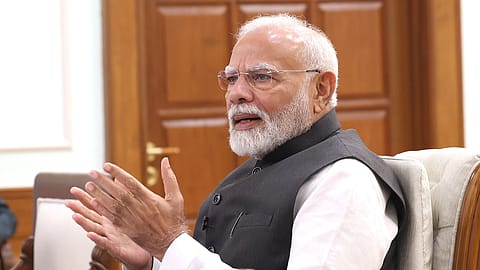‘A milestone for daughters of Bihar’: PM Modi launches Mukhyamantri Mahila Rojgar Yojana, transfers ₹7,500 crore to 75 lakh women
The new state scheme, integrated with the Centre’s Lakhpati Didi campaign, aims to empower women through self-employment by providing up to ₹2 lakh in phased support

Prime Minister Narendra Modi launched Bihar’s Mukhyamantri Mahila Rojgar Yojana (MMRY) through video conferencing on Friday, transferring ₹10,000 to the bank accounts of 75 lakh women in the state—covering an initial budget of ₹7,500 crore for the programme’s first stage.
PM Modi described the scheme as a “milestone for the daughters of Bihar,” stating that every family in the state will have at least one woman beneficiary. The programme is designed to promote economic independence and self-employment by providing women with an initial grant of ₹10,000, which can be increased to ₹2 lakh, depending on the success of their enterprise.
Beneficiaries can use the funds to start small businesses in various sectors, including agriculture, livestock rearing, handicrafts, tailoring, weaving, and retail. Training support will be provided through Bihar’s extensive self-help group (SHG) network, which already has 11 lakh active groups. To improve market access, the government will expand Gramin Haat-Bazaars.
“The scheme further strengthens our Lakhpati Didi campaign, under which more than two crore women across India have already crossed the lakhpati milestone,” Modi said, averring that Bihar could soon lead the nation in women-led income generation.
The Prime Minister connected the implementation of the scheme to previous structural reforms, such as the Jan Dhan Yojana, which enrolled 30 crore women into the banking system. He remarked, “Without Jan Dhan accounts, Aadhaar, and mobile connectivity, today’s direct transfer would not have been possible.”
He also positioned MMRY as part of a larger framework of women-centric initiatives—including Mudra Yojana, Drone Didi, Bima Sakhi, and Bank Didi—designed to expand women’s role in entrepreneurship and employment.
In addition to economic initiatives, PM Modi highlighted health and welfare programmes like the recently introduced Swasth Nari and Sashakt Parivar Abhiyan. These programmes have been hosting 4.25 health camps aimed at screening women for anaemia, diabetes, hypertension, and cancer. “When a woman advances, the whole society advances,” he stated.
The Prime Minister also highlighted that the government continued the food grain scheme it had launched during the challenging time of the Covid-19 pandemic—given the immense relief it provided—and today, under the PM Garib Kalyan Anna Yojana, over 8.5 crore needy individuals in Bihar are receiving free ration.
Bihar chief minister Nitish Kumar and Union minister Rajiv Ranjan Singh, among others, attended the event, which over one crore women across the state witnessed at the district, block, and village levels.